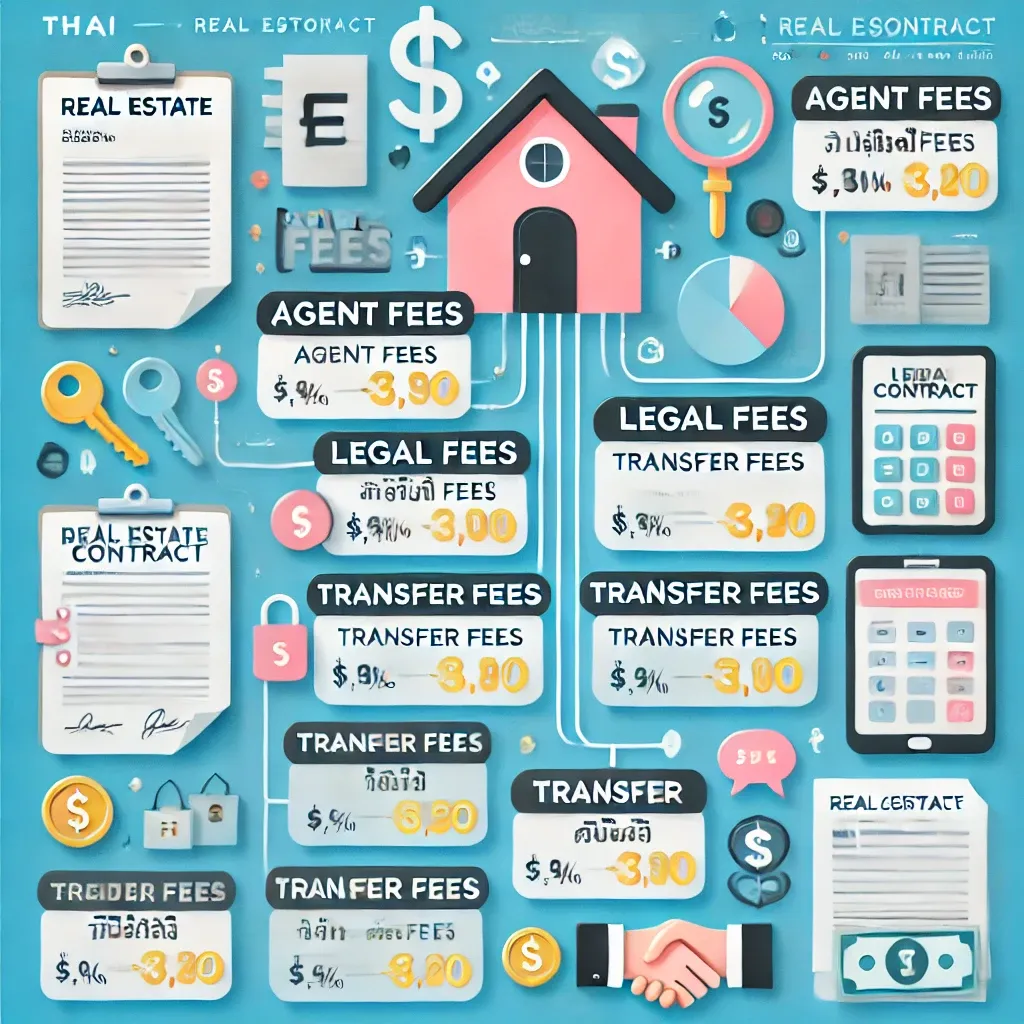Property taxes in Thailand: what does a buyer need to know?

- What are the property taxes and forms of ownership in Thailand?
- What financial aspects should be considered when buying real estate in Thailand?
- What are the expenses and taxes when selling real estate in Thailand?
Property taxes in Thailand
This text discusses the system of property-related taxes in Thailand, as well as key aspects of owning such property. It focuses on various taxes, including property tax, taxes upon acquisition, maintenance costs, taxes in the event of a sale, as well as inheritance and gift taxes.
Forms of property ownership
In Thailand, there are two main forms of property ownership:
- Freehold- the owner receives full rights to the property.
- Leasehold- The investor has the opportunity to use the property for 30 years, and with the presence of a contract, the term can be extended twice more, ultimately reaching 90 years.
If a tenant who owns property under leasehold decides to sell their property or pass it on as an inheritance, the new owner will be able to continue using the property until the lease term expires.
Market trends
Recently, there has been a trend where more and more Russians are opting for leasehold options. This is explained by the fact that the costs associated with such properties are often more affordable compared to freehold ownership.
An additional fee may be required for freehold, which ranges from 200,000 baht (approximately US$6,630) to 500,000 baht (approximately US$16,570). This fee is usually at least 6.3% of the total property value and is shared between the buyer and the developer.
Real estate tax
As for property tax in Thailand, this topic concerns many, as both foreigners and locals note its absence here, unlike in other countries. In 2020, the Thai government planned to implement this tax, but the exact timelines and conditions for its introduction remain unclear.
There is an opinion that the property tax may apply to properties worth more than 50 million baht, and will amount to 0.3% of the transaction value. There is also discussion about the possibility of introducing a rate of 0.01% for owning multiple properties. Currently, the tax initiatives have not been officially approved, as everyone is waiting for the beginning of 2020.
Taxes when purchasing real estate
When purchasing real estate in Thailand, it is important to consider the transaction tax, which is paid once at the time of registration of the purchase with the land department. This tax is 1.1% of the contract value for a leasehold apartment, and the payments are shared between the buyer and the developer, allowing the buyer to ultimately pay only 0.55% of the total transaction amount.
Annual taxes
In addition, there are no annual property taxes in Thailand. However, aside from the aforementioned transaction tax, it is important to consider:
- Assessable transfer tax, which is equal to 2% of the assessed value of the property.
These are important points that everyone planning to buy or sell real estate in Thailand should definitely consider.
Financial aspects of purchasing real estate in Thailand
When purchasing real estate in Thailand, it is important to consider several financial aspects. First of all, legal services related to the preparation of the contract will cost around 10,000 baht, which is equivalent to 330 US dollars. This amount may vary depending on the developer and the type of property.
The payment to the capital repair fund
In addition, a one-off payment to a capital improvement fund, known as a ginking fund, will be required when you take title to your home. This requirement applies to properties under construction, so there is no such condition in the secondary market. Depending on the specific project, tax costs are usually between 500 and 700 baht, which corresponds to $16-23 per square meter. There are also investment projects that do not have this additional tax.
Buying a studio apartment
When considering the purchase of a studio of about 30 square meters, the initial expenses can range from 400 to 500 dollars. If a foreigner wishes to buy a villa with a leasehold arrangement, they can obtain full rights to the building by paying either the full amount or half of the transfer tax, which is 2% of the market value of the property. As for the land, it can be arranged for long-term lease, and there will also be a registration tax to pay, which is 1.1% of the contract value.
Regular expenses for property management
An important role in property management in Thailand is also played by regular expenses. One of the main annual payments is the maintenance fee, which is charged monthly but paid in a single payment for the entire year. Depending on the conditions of a specific project, this fee ranges from 50 to 70 baht, which is approximately 1.6 to 2.3 dollars per square meter per month. This amount is multiplied by 12 to determine the annual expenses. Some investment projects may offer to waive this fee for the duration of the guaranteed return on investment program.
Comparison of service costs
- When purchasing a studio apartment of 30 square meters, the annual maintenance costs can amount to around 720 dollars.
- Some developers offer a waiver of this fee for the first few years after purchase.
Additional expenses when buying a property
When purchasing property, it is also important to consider the expenses related to the installation of water and electricity meters. These costs usually amount to around 20,000 baht (663 dollars) and are paid once during the property registration process. Utilities such as water supply, electricity, and internet will be billed based on actual consumption once the new owner has moved into the residence.
29 September
29 January
9 October 2024
9 October 2024

The average monthly costs for living in Thailand range from 1000 to 1500 baht, which is equivalent to about 33-50 US dollars. Mainly internet costs are around 600 baht (or 20 euros) per month. However, if you consider investing in real estate, you can significantly reduce these costs or even get rid of them altogether.
Taxes on real estate sales
When it comes to taxes on real estate sales, Thailand has specific rules. In typical situations where a residential property sale takes place, both parties share the transfer fee and the property purchase tax equally.
It is important to note that if the owner decides to sell the apartment before the five-year period from the date of acquisition has expired, such a transaction will be classified as a commercial one. This will result in the need to pay a special business tax (SBT), which is 3.3% of the property's value. Most freehold owners do not sell their properties earlier than ten years, making this tax irrelevant in the future when selling.
Withholding tax
It is also necessary to mention the withholding tax, which applies exclusively to freehold transactions. Its amount depends on the time of ownership and the total value of the property, where the rate can vary from 0 to 0.35%, and stamp duty is 0.5%. In the case of a leasehold sale, the seller is only liable to pay stamp duty.
Calculation of expenses when selling an apartment
Now let's calculate the possible expenses when selling an apartment valued at 3 million baht (approximately 100 thousand dollars) in freehold format. If the property has been owned for less than 5 years, a special tax of 3.3% is deducted from the 3 million baht, which amounts to 99,000 baht. Next, a withholding tax is added, which can reach 10,500 baht, as well as a stamp duty of 15,000 baht. Thus, the total amount of tax payments will be around 124,500 baht (about 4,150 US dollars).
If the ownership period exceeds 5 years, only the withholding tax (up to 10,500 baht) and the stamp duty (15,000 baht) are deducted from the amount of 3 million baht. As a result, the total tax obligations will amount to 25,500 baht (approximately 850 dollars). In this case, all registration fees are paid by the buyer, but the legislation does not specify who exactly — the seller or the buyer — should cover this tax. In practice, the payment is made according to the agreement reached by the parties.
Inheritance and gift taxes
Regarding inheritance and gift taxes, according to the law, for close relatives, the tax related to the right to inherit is 0.5% of the value of the property. At the same time, the tax for heirs who have no familial ties to the owner increases to 2%. Transactions related to inheritance, gifting, or resale of real estate also require the payment of a transfer fee — a tax on property acquisition.
Importance of property taxes in Thailand
Taxes related to real estate in Thailand are an important part of the financial burden borne by both local citizens and foreign investors. Like in most countries, Thailand's tax system requires careful study and adherence to all procedures to avoid unnecessary expenses and legal nuances.
Conclusion
In conclusion, it is important to note that the real estate market in Thailand offers numerous opportunities for investors and buyers, despite the emerging nuances and changes in tax legislation. The appeal of such property ownership, likeleaseholdIt makes it sought after among foreign citizens who are looking for not only comfortable housing but also investments with high growth potential.
The complex tax structure when buying real estate, combined with the current lack of regular property tax, makes Thailand particularly interesting for long-term investments.
Nevertheless, it is important to be cautious and closely monitor legislative changes that may affect the financial aspects of real estate transactions. In particular, the introduction of a new property tax, which may come into effect in the future, especially for premium-class properties, could impact the investment attractiveness of Thailand.
Key aspects
- To be aware of tax aspects and additional expenses.
- Carefully monitor legislative changes.
- To account for all transactions related to the purchase and ownership of real estate.
Knowledgeabout all tax aspects and additional expenses, such asmaintenance feeandtransfer feeThis can help potential buyers to make more responsible choices. Understanding the cost structure and overheads will not only save you from unexpected financial consequences, but will also help you plan your investment more strategically.
In conclusion, after studying the real estate market in Thailand, I have come to the conclusion that with a thoughtful approach and consideration of all nuances, investing in such a unique country can bring not only the pleasure of living there but also significant financial benefits. I hope that the information presented in this article will help you navigate the world of Thai real estate wisely and make informed decisions that align with your needs and expectations.
Comment
Popular Posts
29 September
383
9 October 2024
1485
9 October 2024
9940
Popular Offers

Subscribe to the newsletter from Hatamatata.com!
Subscribe to the newsletter from Hatamatata.com!
I agree to the processing of personal data and confidentiality rules of Hatamatata














